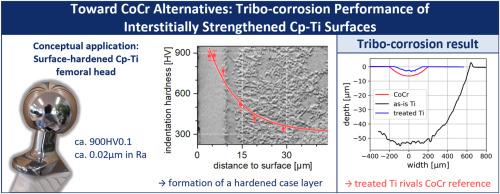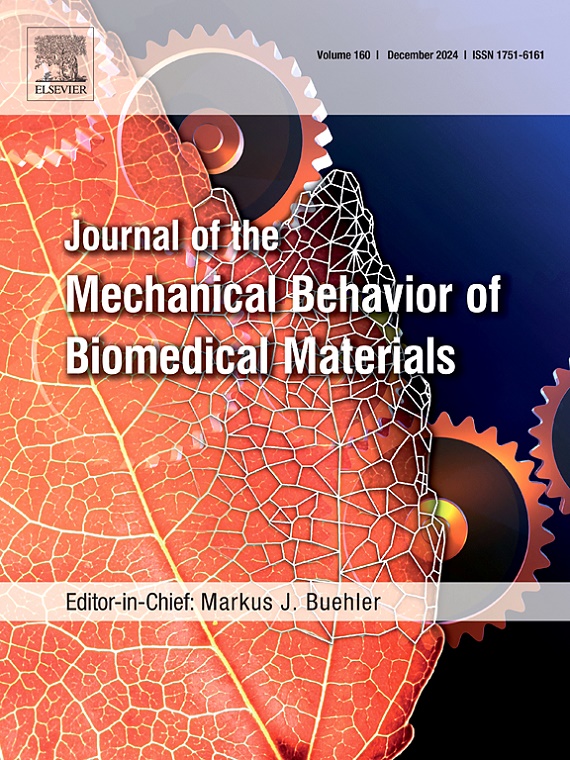CoCr替代品:间隙强化Cp-Ti表面的摩擦腐蚀性能
IF 3.5
2区 医学
Q2 ENGINEERING, BIOMEDICAL
Journal of the Mechanical Behavior of Biomedical Materials
Pub Date : 2025-07-30
DOI:10.1016/j.jmbbm.2025.107145
引用次数: 0
摘要
骨科植入物需要具有生物相容性、耐腐蚀性和磨损性能的材料,以确保安全性、功能性和耐用性。钴铬(CoCr)合金被广泛使用,但对其生物相容性、道德采购和监管限制的担忧促使人们对商业纯钛(Cp-Ti)等替代品产生了兴趣。钛具有良好的生物相容性和耐腐蚀性,但耐磨性不足,这限制了其在承重应用中的应用。本研究探讨了表面工程Cp-Ti的摩擦腐蚀行为。对Cp-Ti进行表面硬化,采用氧化和氮化处理,然后进行真空扩散处理。这些气体表面处理导致表面层间强化,显著提高硬度和耐磨性。后抛光可以降低表面粗糙度,提高关节性能。结果表明,与渗氮相比,氧化产生了更深的扩散区和更高的硬度。使用陶瓷氧化铝球作为对应物的摩擦腐蚀研究证明,表面硬化的钛可以与CoCr合金相媲美。因此,这些发现将表面硬化钛定位为生物医学应用中CoCr的有前途的替代品。本文章由计算机程序翻译,如有差异,请以英文原文为准。

Toward CoCr Alternatives: Tribo-corrosion performance of interstitially strengthened Cp-Ti surfaces
Orthopedic implants require materials with biocompatibility, corrosion resistance, and wear performance to ensure safety, functionality, and durability. Cobalt-chromium (CoCr) alloys are widely used, but concerns regarding their biocompatibility, ethical sourcing, and regulatory restrictions have prompted interest in alternatives such as commercially pure titanium (Cp-Ti). Titanium has excellent biocompatibility and corrosion resistance but suffers from inadequate wear resistance, which limits its use in load-bearing applications. This study explores the tribo-corrosion behavior of surface-engineered Cp-Ti. The Cp-Ti was surface hardened, employing oxidizing and nitriding treatments followed by vacuum diffusion. These gaseous surface treatments led to interstitially strengthened surface layers, significantly improving hardness and wear resistance. Post-polishing was applied to reduce surface roughness and enhance articulating performance. Results show that oxidizing produced deeper diffusion zones and greater hardness than nitriding. Tribo-corrosion investigations using a ceramic alumina ball as a counterpart proved that surface-hardened titanium could rival CoCr alloys. Consequently, the findings position surface-hardened titanium as a promising alternative to CoCr in biomedical applications.
求助全文
通过发布文献求助,成功后即可免费获取论文全文。
去求助
来源期刊

Journal of the Mechanical Behavior of Biomedical Materials
工程技术-材料科学:生物材料
CiteScore
7.20
自引率
7.70%
发文量
505
审稿时长
46 days
期刊介绍:
The Journal of the Mechanical Behavior of Biomedical Materials is concerned with the mechanical deformation, damage and failure under applied forces, of biological material (at the tissue, cellular and molecular levels) and of biomaterials, i.e. those materials which are designed to mimic or replace biological materials.
The primary focus of the journal is the synthesis of materials science, biology, and medical and dental science. Reports of fundamental scientific investigations are welcome, as are articles concerned with the practical application of materials in medical devices. Both experimental and theoretical work is of interest; theoretical papers will normally include comparison of predictions with experimental data, though we recognize that this may not always be appropriate. The journal also publishes technical notes concerned with emerging experimental or theoretical techniques, letters to the editor and, by invitation, review articles and papers describing existing techniques for the benefit of an interdisciplinary readership.
 求助内容:
求助内容: 应助结果提醒方式:
应助结果提醒方式:


